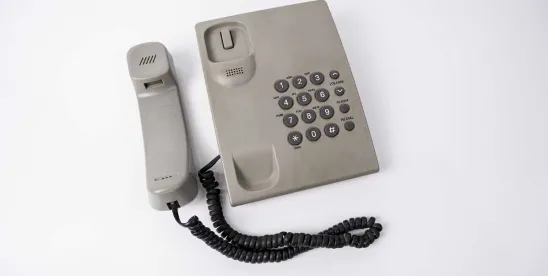Hey, TCPAWorld!
Happy Friday, dear readers. We’re closing out another successful week here at Troutman Amin, so I have no complaints. However, something tells me that a particular corporate defendant—namely, SelectQuote Insurance Services Inc.—has a few.
As of yesterday, SelectQuote was named the defendant in three new complaints. They are all class actions under the TCPA, they were filed on the same day, and they name the same corporate defendant. This raises obvious, but important, questions: Why are there three complaints instead of one? What does this mean for SelectQuote and companies like it?
First, a summary of each complaint.
-
McCann v. SelectQuote Insurance Services Inc. (E.D. Mich.)
The complaint in McCann v. SelectQuote Insurance Services Inc., No. 24-cv-12261 (E.D. Mich. Aug. 29, 2024), charges SelectQuote with violating the National DNC Registry provision of the TCPA by issuing “several telemarketing calls” to McCann’s personal number, which he claims was on the Registry since 2017. Id. at ¶ 22.
McCann specifically alleges that he received two calls in one day from phone numbers with 586 area codes by callers claiming to be from the Medicare rewards program. During the first call, plaintiff allegedly said he was not interested. He then claims to have received a second call from a representative that identified his company as SelectQuote and provided SelectQuote’s 844 call back number. Plaintiff states that he never issued prior express written consent to receive these calls and that they advertised Medicare insurance offerings.
These facts are paltry. It is not clear that SelectQuote made either of these calls, given the mismatched area codes. Even if the second call can be attributed to SelectQuote by the caller’s identification, the first call as stated makes no such attribution. Since the plaintiff needs to plausibly plead that he received at least two telephone solicitations from SelectQuote, this complaint is unlikely to survive the pleadings stage.
-
Ford v. SelectQuote Insurance Services Inc. (M.D. Fla.)
The complaint in Ford, No. 24-cv-020603 (M.D. Fla. Aug. 29, 2024), charges SelectQuote with violating the ATDS provision of the TCPA. Ford says he received a pre-recorded telemarketing call that mentioned Medicare Part A or B but that did not identify the caller. He claims to have “responded” to the pre-recorded message and spoken to a SelectQuote agent after the recording that allegedly promoted SelectQuote insurance services. Id. at ¶ 22. The complaint states that Ford had no prior relationship with SelectQuote and did not consent to receive a pre-recorded call.
Although the Ford complaint seems more facially plausible than the McCann complaint, it is not particularly detailed. For example, Ford’s claim that he responded to a pre-recorded message is ambiguous. It is unclear how he responded—the complaint does not even specify whether he picked up the call or received a voicemail containing a pre-recorded message. It is therefore unclear whether Ford alleges that the ensuing conversation with a SelectQuote agent occurred during the same call as the pre-recorded message that did not identify the caller. The complaint needs to make this connection to plausibly allege that SelectQuote initiated a telemarketing call using a pre-recorded voice. As such, the Ford complaint is vulnerable to a motion to dismiss.
-
Thrower v. SelectQuote Insurance Services Inc. (M.D. Fla.)
Finally, the complaint in Thrower v. SelectQuote Insurance Services Inc., No. 24-cv-00891 (M.D. Fla. Aug. 29, 2024), charges SelectQuote with violating the ATDS provision of the Florida Telephone Solicitations Act (FTSA), the National DNC Registry provisions of the TCPA and the FTSA.
Plaintiff Thrower allegedly registered his personal number with the National DNC Registry in January of 2024, but still received automated telemarketing calls from 850 numbers on May 9 and 11, 2024. He claims that he did not otherwise offer prior express written consent to receive these calls. The callers allegedly gave scripted telemarketing pitches offering to sell him health insurance and, “[o]n the final call[,]” Thrower claims to have spoken with a SelectQuote agent. Id. at ¶¶ 30-31. Despite the description of this call as final, the complaint alleges that this agent called back the same day.
Similarly, Plaintiff McClain claims that she registered her number with the National DNC Registry in 2006, yet received automated telemarketing calls from 904 numbers that contained scripted telemarketing pitches. The complaint states that McClain did not otherwise offer prior express written consent to receive automated calls, that each call attempted to sell her health insurance, and that she spoke with a SelectQuote agent on the final call that tried to sell her insurance.
Like the Ford complaint, the factual allegations in the Thrower are wanting for detail. For example, the complaint states that Thrower received calls from 850 numbers, and McClain from 904 numbers, but fails to offer SelectQuote’s number(s) for comparison. It is unclear whether Thrower allegedly received one or two final calls from the same SelectQuote agent and the complaint neglects to include facts tying the previous calls to SelectQuote. The complaint also only connects the final call McClain allegedly received to SelectQuote. The complaint describes only the automated nature of the calls, the names of the representatives, and concludes that the calls were made for telemarketing purposes. This may be insufficient when challenged on a motion to dismiss—it remains to be seen.
Why are there three complaints?
The McCann complaint is separate because of the plaintiff’s location and was brought in the Eastern District of Michigan, where the plaintiff resides and allegedly received the calls. The plaintiff’s counsel, Paronich Law, P.C., is different than that of the two other complaints.
The Ford and Thrower complaints, however, were brought in the Middle District of Florida and the plaintiffs are all represented by Kaufman P.A. The plaintiffs in these actions also reside in the District, which explains where they were filed. They may have been brought separately because Ford could only have represented the class of ATDS plaintiffs, since he is not alleged to have registered his number on the National DNC Registry.
What does this mean for SelectQuote and companies like it?
Like Troutman Amin has been saying all along, the TCPA has sharp teeth. SelectQuote will have to respond to this litigation, regardless of how meritorious the claims are, and will incur costs doing so. Federal courts in Florida favor TCPA plaintiffs at the pleading stage, so Ford and Thrower may survive a motion to dismiss. Michigan’s federal courts are less predictable, so McCann may not fare as well.
SelectQuote should hire competent counsel for the best chances of disposing of these cases. Companies like SelectQuote should be strict about internal compliance measures to minimize their chances of being sued and of being hit with viable claims.




 />i
/>i

